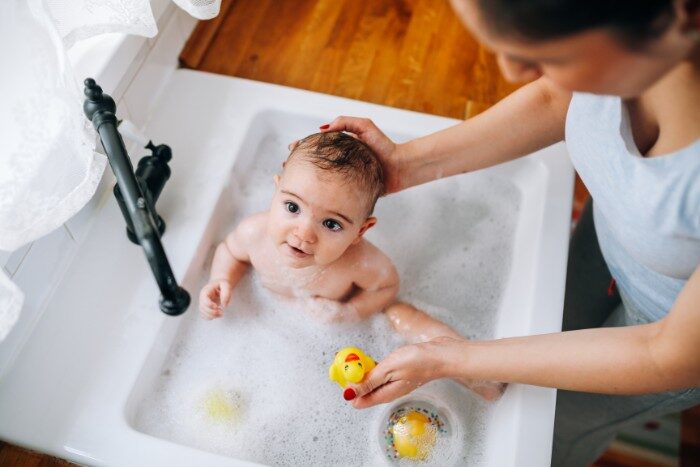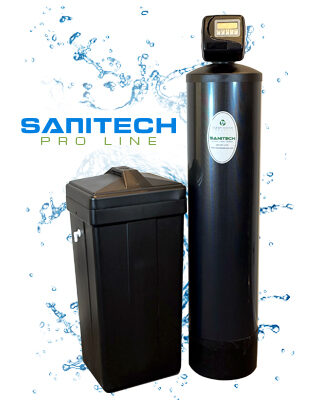
Finding the best water softener system for your home can be overwhelming. With so many brands claiming to offer the top solution, how do you choose the right one that fits your household’s needs and budget? The reality is that most modern water softeners operate using similar on-demand, digital-controlled regeneration technology, which tracks water usage for maximum efficiency. What truly sets systems apart is the quality of the components inside.
A water softener is made up of seven main parts: the control valve, resin, gravel or quartz bedding, resin tank, distributor, brine tank, and float. The control valve and resin are the most essential, as these high-cost components often determine long-term reliability and the need for maintenance. Below, we break down each component so you can understand how to evaluate your options when searching for the best water softener.
Key Considerations Before You Buy
Control Valve: The Brain of the System
At Clear Water Concepts, we use Clack control valves for their dependable performance, advanced efficiency, and user-friendly programmability. The valve is a critical part of any softener because it regulates water flow, monitors usage, and determines how much salt and water are needed during regeneration.
Inside the valve, a flow meter spins like a turbine when water moves through the system. This motion sends data to a circuit board, which records key details like total water usage, flow rates, and service days. High-end valves allow full programming for optimal efficiency.
The best water softener systems rely on a single piston design that opens and closes specific ports within the valve. This promotes simpler mechanics and higher durability. Regeneration cycles typically include service (normal operation), backwash, brine draw, slow rinse, and refill. Clack valves go a step further, including a second backwash cycle after brine draw to evenly redistribute the resin bed for enhanced performance.
Resin: The Workhorse of Water Softening
Resin beads are what actually remove the hard minerals (calcium and magnesium) from your water through ion exchange. The beads hold onto positive ions like sodium or potassium during the regeneration phase. When water flows through the resin tank, the more strongly charged calcium and magnesium ions replace the sodium ions, softening the water.
Eventually, the resin becomes saturated with hardness minerals and needs recharging. During the brine rinse cycle, saltwater regenerates the beads, allowing them to begin the exchange process again.
Resin quality is crucial, especially in places like Phoenix where hard water and chlorine content are high. A high cross-linked resin (often 10% or 16%) offers better durability and resistance to chlorine breakdown. These resins also last longer—typically 10 to 15 years with proper maintenance.
Understanding Price Differences
Water softener prices vary widely, typically ranging from $1,500 to $6,000 installed. National franchise dealers often charge more due to branding, sales commissions, and overhead. Independent water treatment companies, like Clear Water Concepts, offer competitive pricing and customized systems designed for local water conditions.
While brand-name dealers may appear authoritative, many systems share the same technology and components under different labels. The key is understanding what you’re actually paying for, not just fancy presentations or marketing. Comparing component quality and local expertise can save you thousands without sacrificing performance.
Evaluating Component Quality

Many of the best water softener systems available today use certified parts and advanced features to conserve both water and salt. On-demand valves with non-volatile memory and battery backups only regenerate when needed based on your household’s specific usage. This results in lower maintenance costs and up to 50% savings in water and salt consumption.
The control valve remains the most important element. Here are a few points to consider:
- Valves with fewer moving parts tend to be more reliable.
- Single-piston designs are praised for their long-term durability.
- Noryl, a glass-reinforced composite, is the gold standard for valve materials.
- Some overseas-manufactured valves skip Noryl, leading to lower structural integrity, especially in hot climates like Arizona.
System Reliability and Longevity

Today’s reputable water softeners usually feature components certified by the Water Quality Association (WQA) or NSF International. These third-party organizations set the gold standard for water system safety and performance.
Well-established brands and dealers often provide more consistent reliability due to decades of experience and evolving product design. Technological improvements in circuit boards, resins, and valve designs have significantly reduced failures and maintenance issues over time.
However, many lower-priced systems found online or at home improvement stores rely on cheaper materials, especially in the valve housing. These units may be prone to cracking or early failure in warmer regions. When comparing systems, always verify customer reviews, BBB ratings, and licensing. In Arizona, installers must hold a valid contractor’s license for water softening systems.
The Bottom Line: Choosing the Best Water Softener

So, how do you choose the best water softener system for your home?
- Start with your water quality. Is your water supplied from a municipal source or a well? Do you know your water hardness level? Hardness is typically measured in grains per gallon (GPG) or mg/L of calcium carbonate. The higher the number, the more you need an efficient softener.
- Evaluate your household needs. Consider the number of people in your home and average water usage. Systems should be sized accordingly to ensure effective regeneration cycles without excessive salt use.
- Compare control valve technologies. Look for systems with Clack or similarly reputable valves that offer single-piston design, programmability, and durability.
- Check the resin quality. Choose a high cross-linked resin (10% or higher) for longevity and resistance to local water conditions.
- Review pricing carefully. Don’t assume the most expensive system is the best. Often, independent companies offer better technology at more affordable rates.
- Look for certification and licensing. Ensure your installer is licensed in your state and that the product has WQA or NSF certification.
- Ask about maintenance needs. On-demand systems generally require less attention and waste fewer resources. Consider adding a pre-filter to reduce sediment and extend resin life.
Whether you’re upgrading an old softener or purchasing for the first time, choosing the best water softener system comes down to understanding your water, your household needs, and the components that make up a high-performing, long-lasting solution.
Let Clear Water Concepts Help

At Clear Water Concepts, we specialize in providing high-quality water softener installations designed for Arizona’s challenging water conditions. Our systems are built using industry-leading components like Clack valves and premium resins to ensure long-term reliability. Contact us for a free consultation and discover why we’re a trusted choice for homeowners looking to find the best water softener system available.


